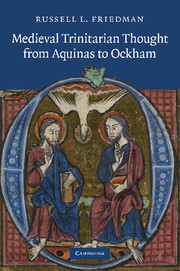Book contents
- Frontmatter
- Contents
- Acknowledgments
- List of symbols, abbreviations, and conventions
- Introduction
- 1 The Trinity and the Aristotelian categories: different ways of explaining identity and distinction
- 2 The Trinity and human psychology: “In the beginning was the Word”
- 3 The Trinity and metaphysics: the formal distinction, divine simplicity, and the psychological model
- 4 The Trinity, divine simplicity, and fideism – or: was Gilson right about the fourteenth century after all?
- Appendix: Major elements in Franciscan and Dominican trinitarian theologies
- Bibliography of primary sources
- Annotated bibliography of selected secondary literature
- Index
- References
4 - The Trinity, divine simplicity, and fideism – or: was Gilson right about the fourteenth century after all?
Published online by Cambridge University Press: 26 February 2010
- Frontmatter
- Contents
- Acknowledgments
- List of symbols, abbreviations, and conventions
- Introduction
- 1 The Trinity and the Aristotelian categories: different ways of explaining identity and distinction
- 2 The Trinity and human psychology: “In the beginning was the Word”
- 3 The Trinity and metaphysics: the formal distinction, divine simplicity, and the psychological model
- 4 The Trinity, divine simplicity, and fideism – or: was Gilson right about the fourteenth century after all?
- Appendix: Major elements in Franciscan and Dominican trinitarian theologies
- Bibliography of primary sources
- Annotated bibliography of selected secondary literature
- Index
- References
Summary
FIDEISM, PRAEPOSITINIANISM, AND THE DEBATE OVER PERSONAL CONSTITUTION
In the previous chapter I began to discuss a trend in fourteenth-century trinitarian theology that I labeled “The Search for Simplicity.” I argued there that an overwhelming emphasis on divine simplicity led William Ockham to appeal to the faith as the sole reason for holding a strong use of the psychological model, using the phrase sola fide (“on faith alone”) on several occasions. I called Ockham's use of the psychological model “the psychological model lite” because Ockham said that the Son is literally a Word emanated intellectually, while also basically admitting that he did not know why or how this was the case, since there is no distinct intellect in God. We believe in the strong use of the psychological model – it is held sola fide, its truth assured by revelation and the Catholic Church – and we believe that the Son is a Word having something to do with intellectual emanation; but we can neither explain it nor use reason to support it by making it more plausible or even comprehensible. For Ockham, when it comes to the strong use of the psychological model of the Trinity, reason is fundamentally impotent.
This insistence upon the fundamental impotence of human reason in the face of various theological truths has in fact been seen as a defining characteristic of fourteenth-century thought as a whole.
- Type
- Chapter
- Information
- Medieval Trinitarian Thought from Aquinas to Ockham , pp. 133 - 170Publisher: Cambridge University PressPrint publication year: 2010



